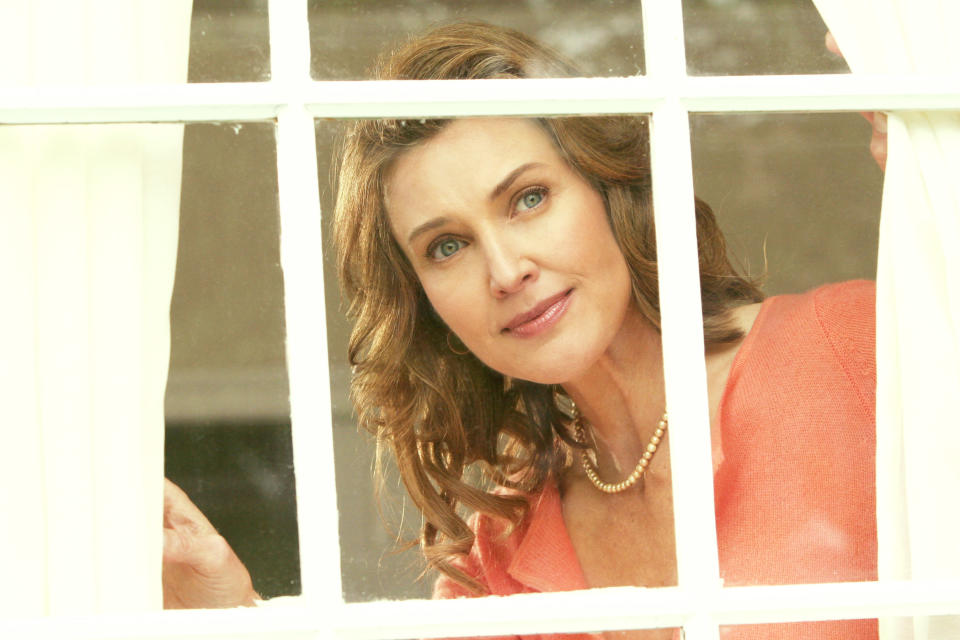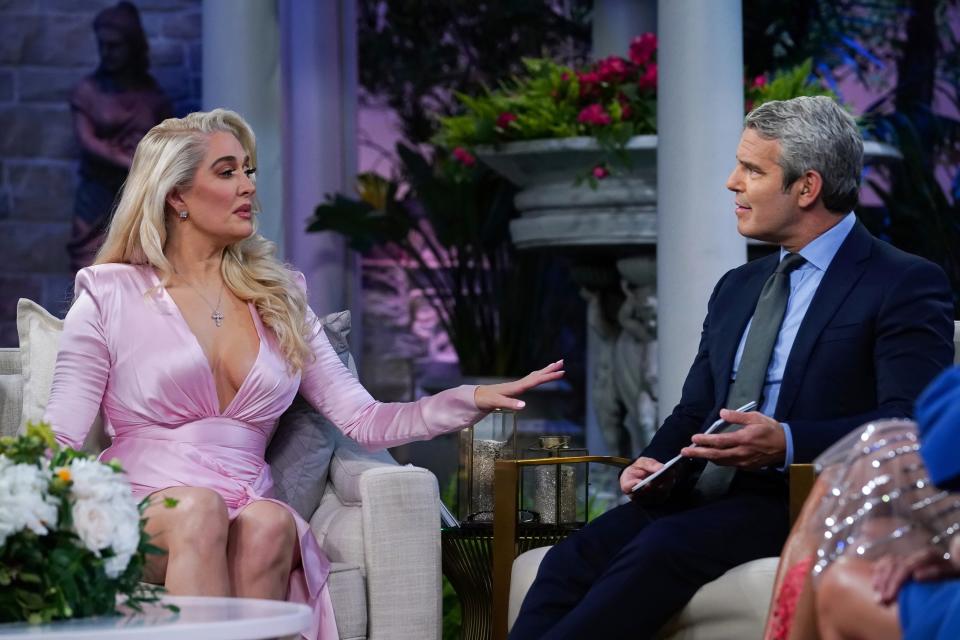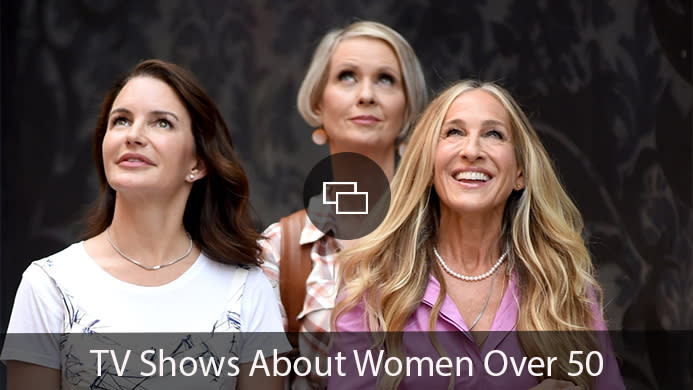How Desperate Housewives Influenced a Decade of TV — & Our Perception of the American Housewife

- Oops!Something went wrong.Please try again later.
- Oops!Something went wrong.Please try again later.
- Oops!Something went wrong.Please try again later.
If you purchase an independently reviewed product or service through a link on our website, SheKnows may receive an affiliate commission.
To say that the TV landscape changed in the years following Desperate Housewives would be an understatement akin to claiming that the neighbors of Wisteria Lane experienced drama. Exactly 10 years ago, on May 13, 2012, Desperate Housewives, created by Marc Cherry, aired its final episode on ABC — and the decade of TV that followed reflects the indelible significance of this female ensemble drama. Since 2012, a new genre of TV bearing imprints of Desperate Housewives’ blending of crime series, suburban sit-coms, and soap operas has emerged, from Mistresses to Big Little Lies to Real Housewives (especially recent seasons of Real Housewives of Beverly Hills). Desperate Housewives — and its prescient grasp on the rise and fall of the American housewife — deserves credit it has not yet been given for the industry and attitudes created in its wake.
More from SheKnows
In hearing the plot of Desperate Housewives today, it’s almost impossible not to think of half a dozen shows exploring a similar premise from the last 10 years. Susan (Teri Hatcher), Lynette (Felicity Huffman), Bree (Marcia Cross), Gabrielle “Gaby” (Eva Longoria), and Edie (Nicollette Sheridan) live in the fictional suburb of Fairview, where everything looks perfect and scandalous secrets lie just beneath the surface. The series is narrated by their friend Mary Alice (Brenda Strong), who kills herself after being blackmailed in the pilot, and who tells the stories of her former neighbors’ misfortunes and misconducts in the beginnings and ends of many episodes: infidelity, extortion, arson, murder, and more.
Click here to read the full article.

©ABC/Courtesy Everett Collection.
After the wildly popular Desperate Housewives came to an end in 2012, here are some of the series that followed: 2013’s Mistresses; 2017’s Big Little Lies and Santa Clarita Diet; 2018’s Good Girls; 2019’s Dead to Me; and 2020’s Little Fires Everywhere. Each of these series features a wealthy female protagonist who gets involved in criminal activity while trying to keep up a façade of a normal life. Each series explores just how much economic privilege can shield its characters from the consequences of their amoral or illegal actions, and each series looks at how stereotypes about women, especially suburban housewives, and especially mothers, can lead to its characters being underestimated when they do pursue a more dangerous path. How can women who appear so right — by society’s standards — act so wrong?
These shows didn’t just tackle similar themes as Desperate Housewives did with its focus on a group of seemingly tame suburban mothers and wives. They also adopted the show’s high-stakes approach to domestic dramas, elevating disputes between parents at their kids’ school to the same level of seriousness as a mafia sitdown, from Desperate Housewives’ Lynette’s bouncy house confrontation over whose child started a lice outbreak to Big Little Lies’ Madeline (Reese Witherspoon) and Renata (Laura Dern) hosting warring birthday parties for their young daughters.
For these women, their reputations are as important as their lives, something Desperate Housewives hammered home as central to its premise with the suicide that opens the series. And while the plots of murder and domestic abuse that plague these women ultimately outweigh petty fights between one another, the importance of keeping up appearances always looms large.
Perhaps this aspect is what led to the ultimate test in keeping up appearances, premiering on Bravo just two years after Desperate Housewives first aired: The Real Housewives of Orange County. The first of the franchise, RHOC was quickly followed by shows in New York City, Atlanta, New Jersey, D.C., Beverly Hills, and more, and 2021 book Not All Diamonds and Rosé confirmed that Desperate Housewives was at the bare minimum responsible for the franchise’s title.
Gretchen Rossi, who joined RHOC’s fourth season, credits Desperate Housewives with providing more than the series’ title, though. “It inspired the Real Housewives franchise — and honestly, I feel I owe a lot to [DH creator] Marc Cherry for creating a show that inspired a real-life version of housewives,” Rossi told Hollywood.com in 2014.
Buy: ‘Real Housewives of Orange County’ Season 1 $9.99
With the lawsuit surrounding RHOBH’s Erika Jayne and her husband Tom Girardi this past year, The Real Housewives franchise has become more similar to Desperate Housewives than ever before. And while Erika’s case may be the most high-profile yet, legal woes coming to light on the franchise are nothing new, from Teresa Giudice and her husband Joe doing prison time for fraud during Real Housewives of New Jersey to Real Housewives of New York City’s Luann de Lesseps getting arrested for disorderly intoxication and battery on New Year’s Eve. These plotlines have made certain Desperate Housewives arcs feel downright plausible, like Gaby’s season 1 struggle to move on after her husband is arrested for importing goods made with slave labor. Perhaps life is imitating art — or maybe desperation is just becoming more real.
While Desperate Housewives has certainly encouraged a more thorough exploration of suburban, domestic women on TV, the fact that the reality series it inspired has dovetailed into similar criminal storylines as the fictional original can perhaps only be accounted for by Desperate Housewives’ specific emphasis on telling the stories of American women, and their uniquely American problems. Wisteria Lane may be a fictional street, but it has an unmistakably American identity, and many of the show’s storylines feature distinctly American themes.
In Season 2 of Desperate Housewives, we see Susan searching (desperately, yes) for a way to get health insurance so she can afford surgery. To solve her problem, Susan nearly marries a gay man who can’t marry his actual partner Steven (Desperate Housewives’ run ended three years before the Supreme Court legalized gay marriage). In that same episode, Gabrielle praises the U.S. for her rags to riches story for providing her with a collection of fine jewelry, telling her Chinese-immigrant housekeeper that, in the U.S., anything is possible.

©Bravo TV/Courtesy Everett Collection.
In season 3 of Real Housewives of Beverly Hills, Yolanda Hadid pulls aside a Hispanic man moving her furniture: “You’re in America now — they speak English here,” Yolanda says. “You know when I come to America, I don’t speak no English…But every night before I go to sleep I studied — so you do the same.”
Wealthy suburban white women may have historically been underestimated and unfairly limited. But, as it turns out, they may not have been so hard to predict — nor were their crimes, or those of their husbands, so many of which were committed in the name of preserving the cash flow required to keep up appearances and maintain their lifestyle. What Desperate Housewives wrote a decade ago, we now see play out in real-time on Bravo cameras, Instagram, and the pages of the LA Times.
Where Mad Men and The Sopranos have been hailed as touchstones that affected not just TV but how our culture perceives the worlds they represent, Desperate Housewives has yet to receive its due. The drama took on, satirized, and ultimately imploded a key element of American culture: the idea of the housewife as a moral paragon for her family. Since that series, and certainly since the Real Housewives universe it inspired, our perception of a suburban homemaker has never been the same — and Desperate Housewives was both a persuasive and predictive clarion call to stop our cultural angelicizing of these women in its tracks.
Buy: ‘Desperate Housewives’ Season 1 $19.99
Before you go, click here and check out these TV shows about women over 50.
Best of SheKnows
Sign up for SheKnows' Newsletter.
For the latest news, follow us on Facebook, Twitter, and Instagram.


